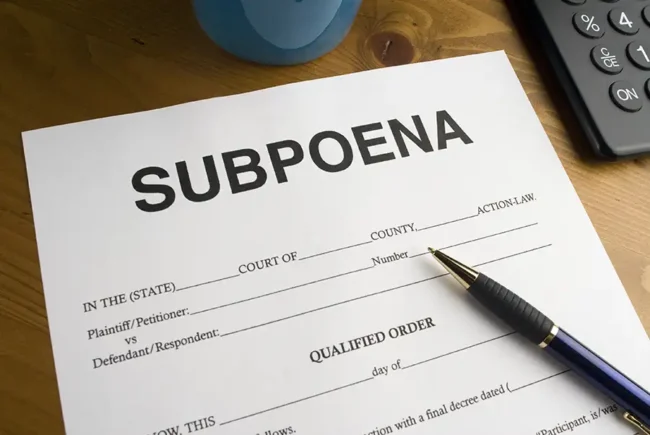Navigating Subpoenas and Process Serving in Texas: An Essential Guide by Hanna & Hanna Reporting
 In the intricate world of Texas legal proceedings, understanding the nuances of subpoenas and effective process serving is paramount. For attorneys, paralegals, and even the general public, a clear grasp of these legal instruments is crucial for ensuring due process and the successful resolution of cases. Hanna & Hanna Reporting, a trusted leader in litigation support across Texas, is committed to demystifying this essential aspect of the legal system. This comprehensive guide will illuminate the subpoena process, detail what constitutes a “service of process,” and explain the consequences of non-compliance, all while highlighting Hanna & Hanna Reporting’s role in supporting your legal needs.
In the intricate world of Texas legal proceedings, understanding the nuances of subpoenas and effective process serving is paramount. For attorneys, paralegals, and even the general public, a clear grasp of these legal instruments is crucial for ensuring due process and the successful resolution of cases. Hanna & Hanna Reporting, a trusted leader in litigation support across Texas, is committed to demystifying this essential aspect of the legal system. This comprehensive guide will illuminate the subpoena process, detail what constitutes a “service of process,” and explain the consequences of non-compliance, all while highlighting Hanna & Hanna Reporting’s role in supporting your legal needs.
The Foundation: Understanding Subpoenas in Texas
A subpoena is a legal document issued by a court or administrative agency compelling an individual to appear in court or at a deposition, or to produce documents or other evidence. In essence, it’s a formal command to ensure the availability of crucial information or testimony for a legal case.
Types of Subpoenas
Texas law recognizes several types of subpoenas, each serving a distinct purpose in litigation:
- Subpoena Ad Testificandum: This is the most common type of subpoena, ordering a person to appear and give oral testimony. This testimony can be in a courtroom, at a hearing, or, most frequently, during a deposition. For a deeper understanding of how these testimonies are captured, explore our page on Deposition Reporting.
- Subpoena Duces Tecum: This type of subpoena compels an individual or entity to produce specific documents, electronic data, or other tangible evidence relevant to a case. It’s often used in conjunction with a subpoena ad testificandum, requiring a witness to testify and bring specific materials. These are crucial for gathering evidence and are often managed through robust litigation support services.
- Deposition Subpoena: Specifically used to compel a witness to appear for a deposition, which is an out-of-court sworn testimony taken under oath. These subpoenas can also include a request for documents (duces tecum). Hanna & Hanna Reporting excels in providing seamless support for these critical pre-trial procedures.
The Significance of a Subpoena
Subpoenas are not mere requests; they carry the full force of the law. Disobeying a properly served subpoena can lead to serious legal repercussions, including contempt of court charges, fines, and even incarceration. Their existence underscores the legal system’s need to gather all relevant information and ensure fairness and transparency in proceedings.
The Crucial Step: “Service of Process”
Issuing a subpoena is only the first step. For it to be legally binding, it must be properly delivered to the intended recipient through a method known as “service of process.” This ensures that the individual or entity being commanded has received official notice and has a fair opportunity to respond.
Methods of Service in Texas
Texas Rules of Civil Procedure dictate the acceptable methods for serving a subpoena. Common methods include:
- Personal Service: This is the most direct and preferred method, where a subpoena is personally delivered to the individual by a qualified process server.
- Certified Mail, Return Receipt Requested: In certain circumstances, a subpoena can be served via certified mail, requiring the recipient’s signature as proof of delivery.
- Substituted Service: If personal service is not possible after diligent attempts, a court may permit substituted service, such as leaving the subpoena with someone over 16 at the recipient’s usual place of abode or business, or by other means reasonably calculated to give notice.
The Role of a Process Server
A “process server” is a crucial component of effective service of process. These individuals are typically licensed or certified professionals tasked with delivering legal documents, including subpoenas, in accordance with state laws. Their role demands diligence, knowledge of legal procedures, and often the ability to locate individuals who may be difficult to find. Hanna & Hanna Reporting works with experienced process servers across Texas to ensure that your subpoenas are served efficiently and correctly.
Consequences of Non-Compliance
Once a subpoena is properly served, the recipient is legally obligated to comply. Failure to do so can result in significant penalties, designed to uphold the integrity of the judicial system.
Penalties for Disobeying a Subpoena
If a person fails to appear or produce documents as commanded by a valid subpoena, they may face:
- Contempt of Court: This is a severe charge, as it signifies disrespect for the court’s authority. Penalties for contempt can include fines, jail time, or both.
- Sanctions: The court may impose various sanctions, such as ordering the non-compliant party to pay legal fees incurred by the party seeking compliance, or even striking pleadings or prohibiting certain evidence from being presented.
- Issuance of a “Body Attachment”: In extreme cases of non-compliance, particularly for a subpoena ad testificandum, a judge may issue a “body attachment” (a civil arrest warrant) to compel the individual’s appearance in court.
Importance of Legal Counsel
It is crucial for anyone who receives a subpoena to seek legal counsel immediately. An attorney can review the subpoena, advise on the scope of the demands, explain the legal obligations, and help navigate potential issues or objections. Compliance is key, but understanding your rights and options is equally important.
Call Your Partner for Texas Litigation Support Services
At Hanna & Hanna Reporting, we understand that the process of issuing and serving subpoenas is a fundamental aspect of successful litigation. While we specialize in providing accurate and timely court reporting services, our commitment to supporting the Texas legal community extends to clarifying these vital legal processes.
Our goal is to provide comprehensive resources that empower legal professionals and enlighten curious minds. From detailed Texas-certified court reporting for your depositions and trials to our robust litigation support, we ensure you have the tools and information necessary to navigate the complexities of the legal system. Our expertise in real-time reporting, remote depositions, and secure digital delivery complements a streamlined subpoena process, ensuring that your legal team operates with maximum efficiency and confidence.
We are happy to provide a variety of legal resources for all types of readers under our Resources tab. Whether one is a prospective client, a court reporting student, or a curious reader, anyone can find more information on the world of litigation support. Contact Hanna & Hanna Reporting today to learn how our litigation support services can support your next legal proceeding.
